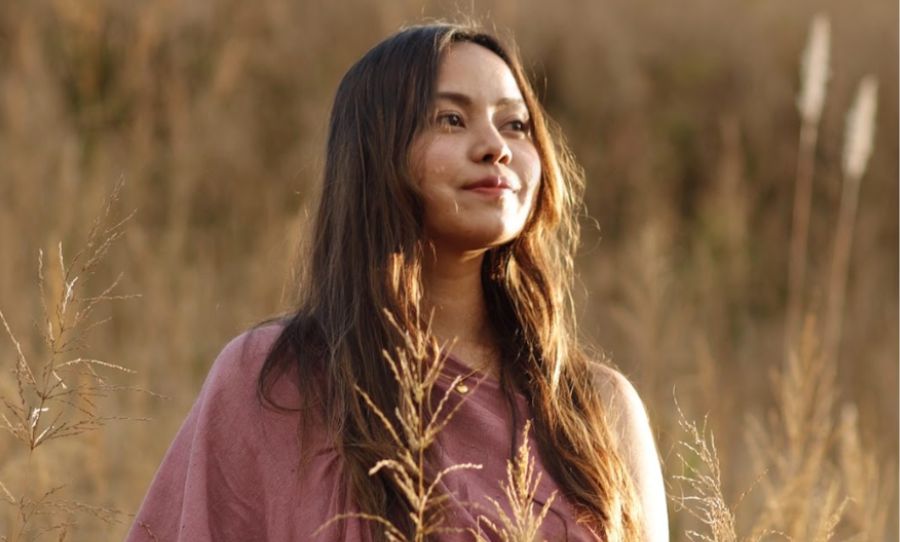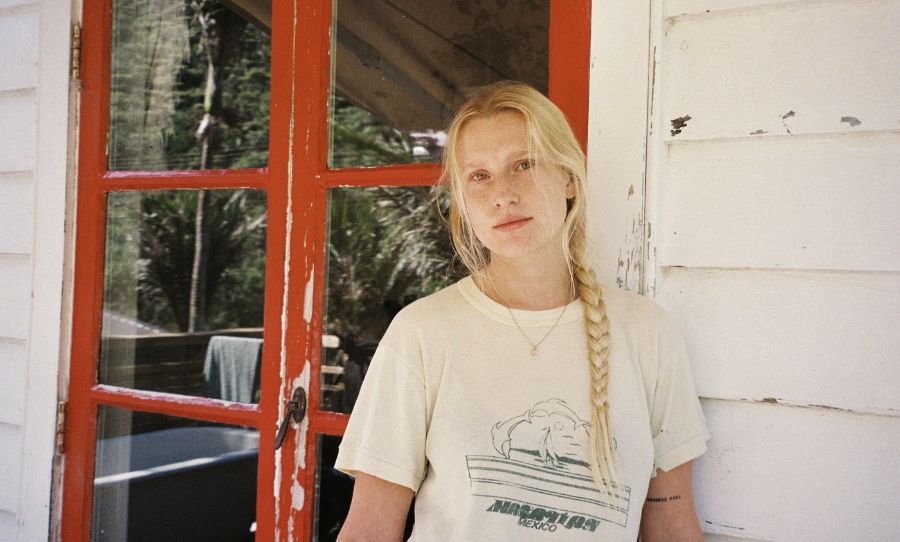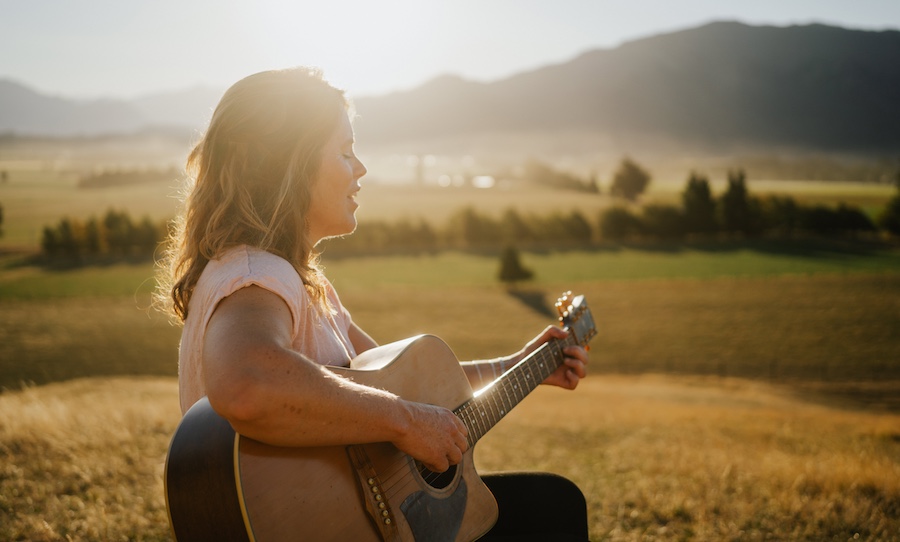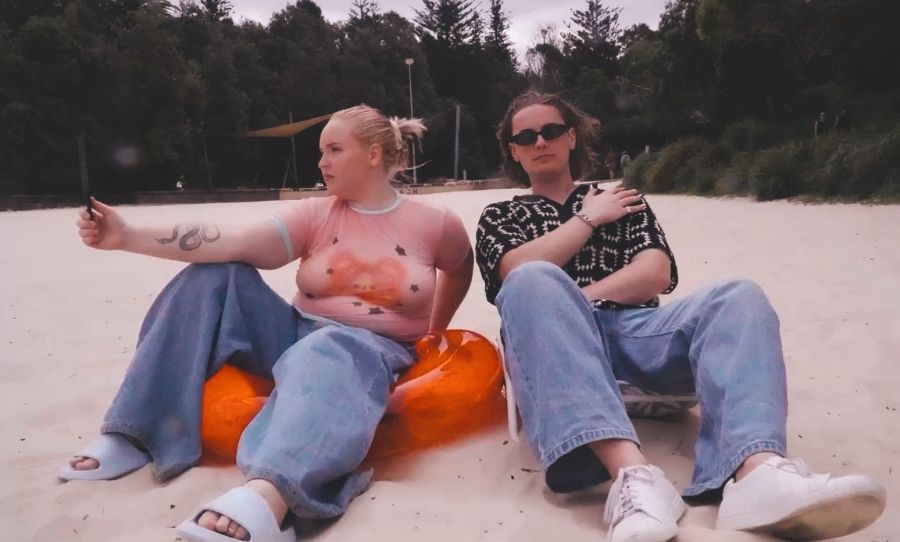In a world where authenticity and artistry collide, Cana Nongkhlaw is carving out her own musical niche
Hailing from the lush hills of Shillong, Meghalaya, the Khasi artist is a torchbearer for her Indigenous heritage, blending it seamlessly with folk, jazz, and contemporary sounds.
With her golden retriever by her side and the winter chill of Shillong setting the scene, Cana is busy creating music that’s as personal as it is profound.
Her latest venture, a Khasi Folk Jazz fusion project, reflects her journey of reclaiming cultural roots and embracing experimentation. Whether reimagining traditional oral storytelling or crafting introspective lyrics, Cana’s artistry is deeply connected to her identity and environment.
With her soulful track Here and Now as a starting point, she’s proving that music is more than a medium—it’s a bridge between the past and the future, uniting history, emotion, and innovation.
HAPPY: What are you up to today?
CANA NONGKHLAW: I’m back home in Shillong and it’s winter here – I’m having a cozy morning with my goldie pup, soaking in the warmth of home. I’ll be heading to the studio in the afternoon to record a Khasi Folk Jazz fusion song which I’m really excited about. Later, I’m looking forward to catching up with friends while I’m home!
HAPPY: Tell us a little bit about where you are from, what do you love about it?
CANA NONGKHLAW: I am a Khasi from Shillong, Meghalaya and I’ve grown up in the Hills all my life. There is so much I love about where I’m from – however it has been quite a journey to decolonise, reclaiming and reconnecting with my cultural roots as an Indigenous Khasi woman in a place shaped by its colonial past.
I take pride in belonging to a matrilineal society, where women pass down their clan names (last names) to the next generation. It’s a unique tradition, and the youngest daughter of the family plays a vital role as the custodian of ancestral heritage.
What I love most about my hometown is its rich culture. From the rolling hills to the waterfalls, and the folklores tied to them. So much of who I am is deeply connected to the land and language.
HAPPY: Can you tell us a bit about the creative process behind Here And Now? How did the recording and production come together for this release?
CANA NONGKHLAW: I wrote part of Here and Now on a ukulele when I was around 17 or 18. At the time, it felt more like a journaling process—a moment of self-reflection through music. That’s often how my creative process works; meeting with myself, having a conversation, and expressing matters of the heart.
I revisited the song about two years ago when my friend Greg Nongrum, a producer based in Shillong, offered to help me develop it into a full release. With his support, I took the track to the studio, and we were finally able to bring it to life as part of an EP and share it with the world.
View this post on Instagram
HAPPY: Who or what are some of your biggest influences as an artist?
CANA NONGKHLAW: I’m drawn to artists who are poetic in their work—those who create honest art and weave real conversations into their lyricism. Artists who are unafraid to explore deeply personal or challenging themes and refuse to confine themselves musically; versatility and authenticity is what inspires me.
I especially love Hozier for this reason. His music resonates deeply, blending raw emotion and meaningful storytelling. I’m also drawn to folk music because of its vulnerable, honest narratives—it’s deeply relatable and profoundly moving.
And then there’s jazz! It’s such an open and limitless genre, offering boundless opportunities for creativity. Its freedom of expression is incredible, constantly pushing the boundaries of what music can be.
HAPPY: How has your background shaped the kind of music you make today?
CANA NONGKHLAW: The Khasis are a deeply musical tribe. As an oral culture, storytelling, folklore, and folksongs have always been integral to our identity. However, it is sadly becoming a dying art.
Music has always surrounded me through culture. I’ve always felt a deep connection to songs that spoke to me in moments when words alone couldn’t capture my emotions. For me, music and poetry have been the artforms I’ve found comfort in.
This connection is what drives me to create. It’s about expressing myself in the most honest way possible—allowing my songs to be part of a conversation, to honour my emotions, and to translate them into words and melodies.
HAPPY: What’s been the most rewarding part of your journey as a musician so far?
CANA NONGKHLAW: The joy of expression is incredibly rewarding. As an Indigenous woman, having the opportunity to voice my experiences—whether it’s about indigeneity, mental health, or other personal themes—is deeply fulfilling. Putting my writing and music out into the world and seeing people connect with it, resonate with the messages, and engage in the discourse is profoundly amazing.
Another aspect I cherish is collaboration. Creating music with other artists, learning from them, and being inspired—or even completely amazed—by the art they bring to the table is such a gift. Bringing my own piece into that shared creative space, combining ideas and talents, and crafting something meaningful together is a beautiful process.
I love the sense of community that comes with making art—a shared space where expression, connection, and creativity come together to create something beautiful and meaningful.
HAPPY: What do you hope listeners feel or take away from your music?
CANA NONGKHLAW: Everyone experiences art differently— music has a way of speaking to people in unique and personal ways. I’ve found myself learning new meanings of my own songs through the interpretations shared by friends or listeners. Their reflections on the music often reveal perspectives I hadn’t considered.
Ultimately, I hope my music resonates with people in whatever way they need it to—whether it’s comfort, connection, or simply a moment of introspection. The experience is theirs to define, and that’s what makes creating and sharing music so special!
HAPPY: How do you balance experimenting with your sound while staying true to your roots?
CANA NONGKHLAW: Balancing experimentation with staying true to my roots has been a deeply personal journey, shaped by reflection and decolonization. For much of my life, the dominant framework of music I was exposed to was Western, whether it was songwriting and playing instruments. It took time to realize how much this shaped my understanding of music and limited my connection to my own cultural heritage.
Recently, I’ve been exploring ways to reconnect with my roots by writing more in Khasi and creating fusion songs with genres like Jazz and including Khasi words in English songs. Remaking music this way has been an important process of rediscovery, drawing from our oral traditions of storytelling and embedding them into my music.
This approach allows me to honour the rich history of my culture while remaining open to experimenting and expanding my sound. For me, staying true to my roots doesn’t mean resisting change—it’s about grounding myself in the traditions that shaped my identity while embracing new ways to express those stories.
HAPPY: What’s one piece of advice you’d give to someone just starting out in music?
CANA NONGKHLAW: Look for and practice authenticity— take time to meet with yourself. Songwriting can be a deeply healing process, and it’s your connection to your true self that will guide your art in meaningful ways. Always tell your story, because it’s uniquely yours and absolutely worth sharing.
When it comes to musicality, don’t be afraid to explore. Experiment with different styles, sounds, and techniques until you find what resonates with you. Don’t limit yourself—music is a vast, open space where you can discover and express who you are.
HAPPY: What’s next for you after Here and Now? Any upcoming projects or collaborations?
CANA NONGKHLAW: Absolutely! A Jazz EP is on the way with some incredibly talented friends in Sydney. The EP will include jazz-infused versions of a few songs from my previous release, some newly written jazz originals, and maybe even a jazz standard!
I’m also recording a Tribal Khasi Jazz fusion song that explores the theme of reclaiming Indigenous roots, along with a couple of folk songs. It’s been an exciting journey blending traditional Khasi sounds with jazz to create something unique and meaningful.
I’m also collaborating with Cassidy, a Lofi artist from Shillong, who I’ve absolutely loved working with. We’re planning to release more Lofi and mellow tracks soon. I’m thrilled to share it all!
HAPPY: What makes you happy?
CANA NONGKHLAW: Catching sunsets, seeing the people I love smile, a Khasi food called Phan with Tungtap + Jamyrdoh, hanging out with my dog, friendships and my family :)





